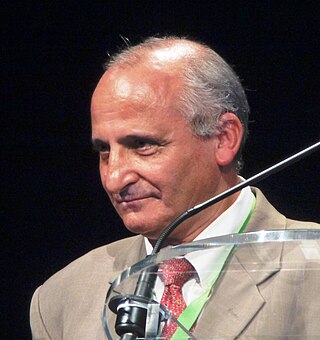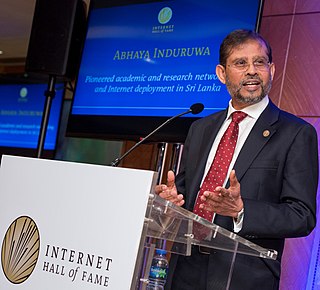
Nanyang Technological University (NTU) is a public university in Singapore. Founded in 1981, it is also the second oldest autonomous university in the country.

Diomidis D. Spinellis is a Greek computer science academic and author of the books Code Reading, Code Quality, Beautiful Architecture (co-author) and Effective Debugging.

The University of Moratuwa is a public university in Sri Lanka. It is located on the bank of the Bolgoda Lake in Katubedda, Moratuwa, a suburb of Sri Lanka's capital Colombo.

The Fleming valve, also called the Fleming oscillation valve, was a thermionic valve or vacuum tube invented in 1904 by English physicist John Ambrose Fleming as a detector for early radio receivers used in electromagnetic wireless telegraphy. It was the first practical vacuum tube and the first thermionic diode, a vacuum tube whose purpose is to conduct current in one direction and block current flowing in the opposite direction. The thermionic diode was later widely used as a rectifier — a device that converts alternating current (AC) into direct current (DC) — in the power supplies of a wide range of electronic devices, until beginning to be replaced by the selenium rectifier in the early 1930s and almost completely replaced by the semiconductor diode in the 1960s. The Fleming valve was the forerunner of all vacuum tubes, which dominated electronics for 50 years. The IEEE has described it as "one of the most important developments in the history of electronics", and it is on the List of IEEE Milestones for electrical engineering.
Dynamic voltage restoration (DVR) is a method of overcoming voltage sags and swells that occur in electrical power distribution. These are a problem because spikes consume power and sags reduce efficiency of some devices. DVR saves energy through voltage injections that can affect the phase and wave-shape of the power being supplied.

Rachid Yazami is a Moroccan scientist, engineer, and inventor. He is best known for his critical role in the development of the graphite anode for lithium-ion batteries and his research on fluoride ion batteries.
Deshamanya Nandadasa Kodagoda MRCP was a Sri Lankan medical doctor and academic who was Vice Chancellor of the University of Colombo.

Abhaya Induruwa is the inaugural Professor V K Samaranayake Endowed Professor of Computing, University of Colombo School of Computing, Sri Lanka. Having served as the Director of Cyber Innovation Hub he recently retired from the Canterbury Christ Church University in the United Kingdom where he researched into security and forensic investigation of Internet of Things (IoT). Currently he is engaged in promoting IoT in digital agriculture as a disruptive technology, primarily in developing countries, leading to smart agriculture resulting in higher yields in food production. Induruwa is considered the father of Internet in Sri Lanka.
Samarajeewa "Sam" Karunaratne, FIET, FIEE, FIESL is an emeritus professor of engineering and a leading Sri Lankan academic who is the founding chancellor and president of the Sri Lanka Institute of Information Technology and the former vice-chancellor of the University of Moratuwa. He has held a number of other appointments in the field of higher education in Sri Lanka, including senior professor of electrical engineering and dean of the Faculty of Engineering and Architecture, president of the Institution of Engineers, Sri Lanka. Karunaratne is a pioneer in the development of the use of computers in the field of engineering and played an important role in the development of information technology education and industry in Sri Lanka.

Asoka Nalanda Abeygunawardana is a Sri Lankan electrical engineer, environmentalist, social activist and the current Chairman / CEO of the Strategic Enterprise Management Agency at Presidential Secretariat, Sri Lanka.

Frede Blaabjerg is a Danish professor at Aalborg University. At Aalborg, he works in the section of Power Electronic Systems of the department of Energy Technology. Blaabjerg's research concerns the applications of power electronics, including adjustable-speed drives, microgrids, photovoltaic systems, and wind turbines. By the number of citations, he is the most cited author of several IEEE journals: IEEE Transactions on Power Electronics, IEEE Transactions on Industry Applications, IEEE Journal of Emerging and Selected Topics in Power Electronics.
Saman Halgamuge was educated in Germany and Sri Lanka and he is currently a Professor of University of Melbourne, Australia. He is an elected Fellow of Institute of Electrical and Electronics Engineers, USA, Institute of Engineering Technology (IET) UK and National Academy of Sciences Sri Lanka (NASSL). He is a highly cited expert in his field and listed as one of the top 2% cited experts for AI and Image Processing in the Stanford University Database published since 2020. His most-cited paper being Self-organizing hierarchical particle swarm optimizer with time-varying acceleration coefficients, with over 4000 citations, according to GoogleScholar. He is a Distinguished Speaker/Lecturer on Computational Intelligence appointed by IEEE. He has supervised 45 PhD scholars to completion and delivered over 60 keynotes at International and national conferences.

Stepan Lucyszyn is a British engineer, inventor and technologist, and has been a Professor of Millimetre-wave Systems at Imperial College London, England, since 2016. He was elevated to Fellow of the Institute of Electrical and Electronics Engineers (IEEE) in 2014 and elected to Fellow of the Royal Academy of Engineering](RAEng) in 2023. Lucyszyn's research has mainly focused on monolithic microwave integrated circuits (MMICs), radio frequency microelectromechnical systems, wireless power transfer (WPT), thermal infrared technologies and additive manufacturing.

Jacobus Swart is a professor at State University of Campinas - UNICAMP, Campinas, Brazil and was named Fellow of the Institute of Electrical and Electronics Engineers (IEEE) in 2014 for contributions to microelectronics education in Brazil.
Xu Jianbin is the Choh-Ming Li Professor of Electronic Engineering and director of the material research center at The Chinese University of Hong Kong (CUHK). He is also a Distinguished Research Fellow at the Shenzhen Institutes of Advanced Technology, one of the Chinese Academy of Sciences.
Carole Tucker FLSW is a Professor at the School of Physics and Astronomy, Cardiff University. She is a Fellow of the Learned Society of Wales, and a member of the Institute of Physics and the Royal Astronomical Society. Her research focuses on astronomy instrumentation in the fields of far infra-red quasi-optics and spectroscopy. She is a member of the UK EPSRC THz Network, Teranet and a reviewer for the IEEE Transactions on Terahertz Science and Technology.
Thomas H. Lee was a Chinese-American electrical engineer and writer. He worked for General Electric for 30 years, where he developed the first practical vacuum interrupter and the silicon rectifier in the 1960s. In the 1980s he served as the Philip Sporn Professor of Energy Processing at the Massachusetts Institute of Technology and co-chaired the MIT Sloan School's Management of Technology program. He was elected a member of the National Academy of Engineering in 1975 and a foreign member of the Chinese Academy of Engineering in 2000. He was an IEEE Fellow and received the IEEE Haraden Pratt Award in 1983.
Ruwan Chandra Gopura is a professor attached to the Department of Mechanical Engineering, University of Moratuwa, Sri Lanka and a former Head, Department of Mechanical Engineering, University of Moratuwa. He was the Founding Head, Department of Medical Technology, Faculty of Medicine, University of Moratuwa. He is the former Director/Research of University of Moratuwa. Prof. Gopura is currently the Dean, Faculty of Graduate Studies at the same university. He was the chairperson of IEEE Sri Lanka Section in 2020. He was the chair of IEEE Robotics and Automation Society Sri Lanka Section Chapter from February 2017 to February 2020. He was the secretary of the same Chapter from 2013 to 2017. Gopura was the secretary of IEEE Sri Lanka Section in 2015. He is a senior member of the Institute of Electrical and Electronics Engineers (IEEE) and IEEE Robotics and Automation Society. Ruwan Gopura is a founding member of Sri Lanka Robotic Meetups. He is an editorial board member of reputed international journals. He won the IEEE Sri Lanka Section, "Most Outstanding Volunteer Award 2022 " at the IEEE Sri Lanka section awards held on the 17th September, 2022.

Michael Unser (born April 9, 1958 in Zug, Switzerland) is a Swiss engineer and a professor at the École Polytechnique Fédérale de Lausanne (EPFL). His research focuses on the field of biomedical image processing.
Lauren Gawne is a linguistics researcher and academic communicator, most known for her work on gesture and in the linguistics of emoji.










